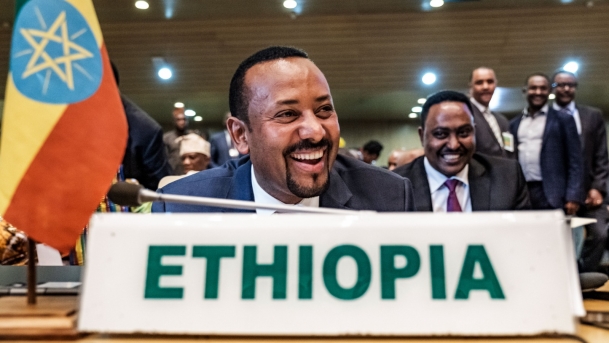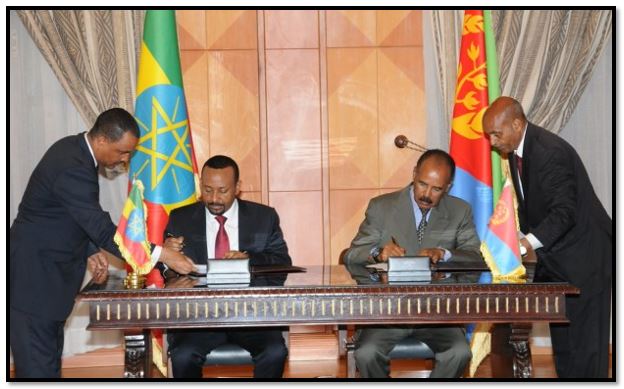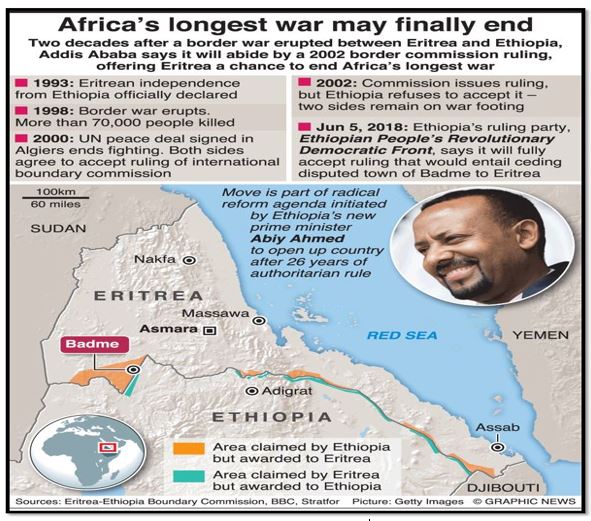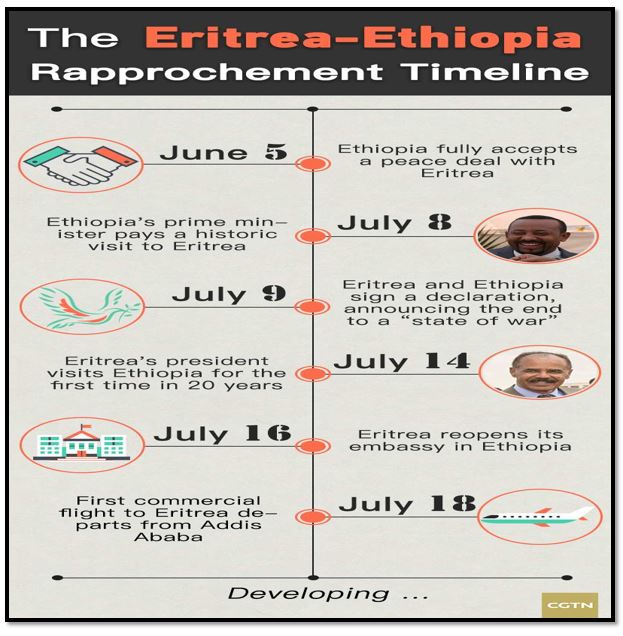
The new reforms of Ethiopia since the political shift in 2018 have captured the imagination of several political analysts since Abiy Ahmed assumed the premiership in February 2018. For instance, Global Risk Insights has maintained he has the power “to create peace within his borders as well as with neighboring countries, bring about equality and representation, foster economic growth, and create a model for other developing markets and nations to follow.” (1) Other foreign observers have argued his appointment gives “some hope for peace, continuity and stability both in Ethiopia and the wider region,” as asserts Professor Ann Fitz-Gerald of Cranfield University in the United Kingdom.(2)
One of the turning points in Ethiopia’s new foreign policy was Abiy’s standing next to long-time Eritrean President Isaias Afwerki on the Ethiopian-Eritrean border, along with military personnel in September 2018, to herald the Ethiopian New Year by “demolishing the trenches along our border.” He also vowed his country’s defence forces along the border with Eritrea would be “gathered to camps to ease tension that was often extreme. The same will be done from the Eritrean side.” (3)
In this paper, Thembisa Fakude researcher at Aljazeera Centre for Studies (AJCS) will assess the accomplishments of Abiy’s government since taking office and juxtapose them with certain urgent sociopolitical challenges the country faces. He will also probe into the impact of internal and external insurgencies and the challenges of gratifying meeting the Oromos’ expectations. He also foresees the rick of sliding back into another turbulent period of protest should those expectations remain unfulfilled.
Abiy Ahmed was elected following the resignation of former Prime Minister, Hailemariam Desalegn on 15 February 2018. Desalegn’s resignation was brought about by two years of sustained protests against the government. Much of public anger stemmed from the continuing dominance of the Tigray ethnic group. Representing only 6 percent of the population, but in control of key business interests, senior positions in government and the military, and owning significant amounts of land, caused resentment towards the Tigrayans among many of the country’s numerous other ethnic groups.(4)
Abiy’s election was significant since it represented an end of the Tigrayans’ dominance in holding top political portfolios since the beginning of coalition politics in Ethiopia in 1991. His election indicated a departure from the norm in Ethiopian politics: he is born of a Muslim father and a Christian mother. This profile was seen as an important step towards national cohesion, particularly in a polarized society like Ethiopia. Additionally, Abiy comes from the Oromo, the largest ethnic group in Ethiopia, who had long felt marginalized under the leadership of the Tigrayans.
Governments and observers around the world have welcomed Abiy’s leadership and praised his political reform decisions. He has released thousands of political prisoners and journalists from jail, appointed a first woman president in the history of Ethiopia and ended the 20-year conflict with neighboring Eritrea.
 |
| Joint Declaration of Peace and Friendship [Yeman Meskel] |
An Open-Ended Promise
Ethiopia’s progress and failures are a consequence of a combination of reasons both historical and contemporary. Ethiopia is the only country in Africa that was never colonized. Mussolini’s forces invaded in 1935 and occupied the capital Addis Ababa for five years. Ethiopia has managed to maintain and preserve its cultures, languages and Amharic written text. Amharic is the official language of Ethiopia, it is also the second most widely-spoken Semitic language in the world, after Arabic.
While boosting Ethiopia’s cultural integrity, minimal Western intervention deprived it of a certain level of development which could be seen in other African countries. However, the recent injections of investments by countries like China are dramatically altering the economic and infrastructural landscape in Ethiopia. Moreover the location of the African Union (AU) headquarters in the country has resulted in many African countries, a number of Western organisations and China investment groups and people moving to Ethiopia particularly to Addis Ababa, bringing economic development with them.
In two decades, the Chinese provided Addis with an $86 million ring road, the Gotera Intersection ($12.7 million), Ethiopia's first six-lane highway ($800 million), and the Ethio-Djibouti Railway line ($4 billion) which connects the landlocked country to the sea (5). They have also brought with them new cultural and political habits which are slowly becoming part and parcel of Ethiopia’s sociopolitical infrastructure. Speaking at the 2019 World Economic Forum (WEF) in Davos Abiy was proud to detail some of his achievements since taking office to the delight of many in the audience.
Among his achievements is the appointment of the first female president in Ethiopia, Sahle-Work Zewde. She adds to a growing number of women leaders that continue to take over power in different countries around the world. Fifty-six of the 146 nations (38%) studied by the World Economic Forum in 2014 and 2016 have had a female head of government or state for at least one year in the past half-century. (6) Since the election of Abiy, Ethiopia has also increased its number of women parliamentarians. Women now hold 37 percent of Ethiopia’s parliamentary seats, almost twice that of women in the U.S. Congress. (7)
Ethiopia has also released all political prisoners; and there is “not a single journalist in prison” in Ethiopia according to the Prime Minister. This could be an impressive achievement in Africa where many political activists and journalists are still languishing in jail for various reasons in other countries. According to the Committee for Protection of Journalists, Egypt jailed a high number 19 journalists on ‘false news’ charges, followed by Cameroon with four, and Rwanda with three.
Ethiopia has been under pressure to transform it media laws. While Ethiopian citizens have become optimistic about the direction their country is heading in, repressive laws that have enabled authoritarianism to remain on the books, including laws designed to constrain freedom of expression and enable unchecked surveillance. (8) The new political attitude towards media is important because it sends a message to other African countries to follow suit. It has also emboldened Ethiopia as key member of the AU to raise issues of freedom of expression without fearing a backlash.
 |
| Africa's Longest War [Eretria-Ethiopia Boundary Commission] |
Perhaps the most important achievement yet of the young government of Abiy is the peace treaty signed with Eritrea. Prime Minister Abiy and President Isaias Efwerki of Eritrea signed the peace treaty in Jeddah, Saudi Arabia July 9, 2018. Ethiopia and Eritrea had been engaged in a border dispute since May 1998. The dispute has resulted in scores of deaths over the years. The Peace Treaty has opened many opportunities not only for Eritrea and Ethiopia but also for the region. During his speech at the WEF in Davos Abiy hinted at the possible formation of a regional army, and at a single regional diplomatic representation abroad. “There is no need to have different armies in Ethiopia, Eritrea and Djibouti. There is no need to have different foreign embassies for East African countries here in Switzerland, we are poor countries we can share”. (9)
 |
| The Eritrean-Ethiopian Rapprochement Timeline [CGTN] |
Two Sociopolitical Urgencies Looming in the Horizon
Since taking office in 2018, Abiy’s achievements have received praise from around the world. However, there are certain situations that urgently require his attention to avoid the country plunging back into political instability and stagnation. Chief among those is a) quelling an internal insurgency within the country and from neighboring Somalia; and b) Dealing with the political and economic expectations of the Oromos.
Quelling Internal Insurgencies and Threats from Neighboring Somalia
There is a new threat of insurgency inside Ethiopia, it emanates from the disgruntled members of the deep state, and from factions within the Tigrayans, particularly from those who feel politically and economically threatened by the new government. Furthermore, another threat facing Ethiopia is the instability brought by the deep state, those who are accused of corruption from within the old administration. The key party in Ethiopia's ruling coalition, the Tigrayan People's Liberation Front, recently voiced its concern over the recent speed and zealousness of reform and said more deliberations were necessary. In the context of Ethiopia's politics, this likely means the hard-liners are preparing to bite back to reassert control and ensure they continue to profit from the regional rivalry. (10)
Prime Minister Abiy has moved swiftly to deal with past corruption and abuse of power. This policy has led to some concerns particularly from the Tigrayan members of the governing coalition. Some of these people are sowing political discord inside the country. They feel unjustly targeted by the government of Abiy. (11) In June 2018, Abiy survived a grenade attack in Addis Ababa while addressing his supporters. Some circles in Ethiopia blamed the Tigrayan-backed groups for the attack. Regardless of who was plotting behind the scene, the attack was evidence that Abiy had made enemies as well as friends since taking office in April 2018. He has shaken up the status quo by pushing for rapprochement with archival, partially privatized Ethio Telecom, Ethiopian Airlines, and other state-owned monopolies as part of a broader push toward decentralizing the economy. He has also sought to weaken the Tigray ethnic minority's stranglehold over the country's political and security system. (12)
The new government in Ethiopia needs to deal with the tensions in the Somali province of Ethiopia also known as Ogaden. Both political and ideological drivers fuel the tensions in Ogaden. From a political perspective, the people of Ogaden feel marginalized by their national government. This situation is further exacerbated by the government’s failure to deliver basic services.
The separatists’ cause has been solidified by widespread resentment at the region’s low level of development. Until Chinese engineers arrived late 2018, the entire region had only 30 km of tarmac road, all of it around the regional capital Jijiga. The area has also been battered by a succession of droughts and floods. (13) Given Ethiopia's large territorial size and geographical barriers, the central government has struggled to exert control over the diverse populations of the hinterlands. Ethnic insurgencies have been a near constant feature of the country's history, and managing them is a key imperative for its leaders. (14)
From an ideological perspective, the people of Ogaden has sought to secede from Ethiopia and become part of “Greater Somalia”. Within the broader national context, ethnic tensions in the Somali state originally emerged with a reclamation of the region as part of ‘Greater Somalia’ done by the Somali government in the seventies. The claim triggered a bloody war fought between Somalia and Ethiopia between 1977 and 1978. (15) Greater Somalia claims large parts of present day Kenya, Ethiopia Somaliland and Somalia. The trans-national borders claims make these ambitions of unity almost impossible. However, most separatists and proponents of Greater Somalia in the Horn of Africa see Ethiopia as the main impediment to realizing their ambitions.
Ethiopia contributes troops to a multinational AU peacekeeping mission also known as African Union Mission in Somalia (AMISOM). It also has troops in Somalia independently under Ethiopian army command (16) . Ethiopia has been engaged in a protracted war with al-Shabbab, an al-Qaeda offshoot that has been responsible for a number of bombings inside Somalia since 2006. It has also targeted Ethiopian troops serving in Somali bases. Al-Shabbab joined forces with a group of sharia courts known as Islamic Courts Union (ICU) in 2006; and both ICU and al-Shabbab wrested control of Mogadishu.
Ethiopia, a majority-Christian nation, invaded Somalia in December 2006 and ousted the ICU from Mogadishu with little resistance. The intervention, which came at the request of Somalia’s transitional government, radicalized al-Shabbab, as recall some analysts. (17) The invasion of Somalia by the Ethiopian troops in 2006 and its contribution to the AMISOM have turned Ethiopia into an arch enemy of al-Shabbab. In late October 2018, al-Shabbab claimed to have killed 30 Ethiopian troops inside Somalia. (18)
Meeting Oromo expectations
The Tigrayan ethnic group have dominated Ethiopia’s contemporary politics since the first multiparty elections held in 1995. Many Ethiopians blame the Tigray People’s Liberation Front (TPLF) for the deterioration of the economy, and what they consider as well-spread political corruption. There is a common belief that their dominance benefited the Tigrayan minority group at the expense of the broader Ethiopian society. They have done that mainly through the governing coalition Ethiopian People’s Revolutionary Democratic Front (EPRDF). The governing EPRDF is made up of a coalition of four political parties namely the Amhara Democratic Party (ADP), Oromo Democratic Party (ODP), Tigray People’s Liberation Front (TPLF) and Southern Ethiopian People’s Democratic Movement (SEPDM). The EPRDF coalition includes the major ethnic groups in Ethiopia, and is intended to be representative of ethnic diversity in Ethiopia.
Indeed, in a country politically polarized and with many tribes like Ethiopia, it could not have moved on politically were it not for the coalition politics. The ERFDP brought some kind of national cohesion within the politics of Ethiopia. However, the domination of the Tigrayans within the coalition led to sociopolitical and economic unevenness, which in turn has led to protests and conflict.
The Oromo are the largest ethnic group in Ethiopia making up 34 percent of the population; Prime Minister Abiy is an Oromo, as already stated. There are high expectations from the Oromo of the new government, most regard Abiys’s victory as their victory. (19) This will perhaps be Ahmed’s greatest challenge moving forward. How will he avoid the tribal trappings that have led to the collapse of Ethiopian sociopolitical fabric in the past and led to nationwide protests? He will have to balance the act; he ought not be seen to be representing the sole aspirations of the Oromo Democratic Party (ODP), his party within the coalition, if he is to succeed as a leader. Achieving that balance will be his first real test. (20)
There are serious expectations in Ethiopia not only from the Oromo but other ethnic groups who felt being excluded by previous governments. Mass protests erupted in Ethiopia's populous Oromia region - home to the Oromo, Ethiopia's largest ethno-national group - in 2015 after a master plan was unveiled to expand the boundaries of the capital, Addis Ababa. The concern among local farmers at the time was that the city would confiscate their lands and leave them without a source of livelihood and with nowhere to go. (21) This led to massive protests by the Oromo resulting in scores of deaths and injuries in the state of Oromia. Although the situation was calmed by the election of Abiy the situation remains extremely volatile as many Oromos embrace a wait –and- see attitude.
Conclusion
Ahmed is not new to Ethiopian politics. His party, ODP, is part of the governing EPRDF. He also served in the previous cabinet of government. It could be argued that most corruption and violations were committed in his presence as a member of the cabinet and a senior member of the ODP within the coalition. He is part of the new political phenomenon in Africa namely “new brooms from the same shop”. Leaders, who rise to power from the same ranks and claim ignorance of party corruption and mismanagement, case in point President Cyril Ramaphosa of South Africa and President Emmerson Mnangagwa of Zimbabwe.
Both were senior members of the governing African National Congress (ANC) in South Africa and National Union -Patriotic Front (ZANU-PF) in Zimbabwe which, remain accused of political mismanagement and corruption respectively. They have managed to bring back hope in politics and to parties they represent in those countries. The challenge these leaders face, including Abiy, is how to deal with corruption within the deep state of their organisations without implicating themselves. In the case of Ethiopia, how is Prime Minister Abiy going to deal with these challenges without weakening the governing EPRDF?
Abiy will have to ensure that the immediate threats to political stability inside Ethiopia are minimized. The first will be to ensure that he partner with all members of the EPRDF to root out corruption and ensure that all those accused of corruption and human rights violations within the coalition face justice. If not, his young government could lose legitimacy and support.
The continued involvement of Ethiopia in Somalia will continue to pose a threat to the stability of the country particularly in Ogaden. Furthermore, there is also a need to include the Ogaden National Liberation Front (ONLF) into some sort of governing coalition in the Ogaden. Imposition of Umar Mustafa as the new President of the province will not lead to long tern political stability in that region. Mustafa Omer was elected as the President of Somali Province in 2018. Omer represents a less popular Ethiopian Somali People’s Democratic Party (ESPDP).
Abiy has an opportunity to weaken separatists politics in the Ogaden by intensifying the government’s service delivery program. Many people in Ogaden particularly the supporters of the popular ONLF doubt if the election of a president from the ESPDP will bring changes to the province given its proximity to the ruling ERPDF. This is one of the political urgencies that the government has to deal with to ensure stability inside Ethiopia. The shared ideology and kinship between members of a-Shabbab and the majority in the Ogaden presents an ever-present danger. Following the deadly attacks by al-Shabbab in Nairobi, Kenya in 2013 and 2018.
It is not farfetched to conclude that it is a matter of time before similar incidences reach the streets of Addis Ababa. Al-Shabaab — the Somalia-based group that carried out the 2013 attack at the nearby Westgate Mall in Nairobi that left 67 people dead — claimed responsibility for the carnage at the DusitD2 hotel complex, which includes bars, restaurants, offices and banks and is in a well-to-do neighborhood with many American, European and Indian expatriates. (22)
Finally, perhaps the greatest challenge of Abiy’s premiership is to meet the expectation of the Oromos in Ethiopia. Understandably, decades of economic and political marginalisation notwithstanding their numbers in the country have to be rectified if the government is to first maintain its grip of power in the province and avoid another round of nationwide protests. It will have to prioritise the political concerns of the Oromos not only because of their numbers within the country but because it was the Oromos who precipitated his rise to power. However whilst addressing the concerns of the Oromos, he will also have to ensure that sociopolitical grievances’ of other ethnic groups in Ethiopia are also addressed.
- Hailemarian, Adium. “Abiy Ahmed: the dawn of a new day for Ethiopia”, Global Risk Insights, June 1, 2018 https://globalriskinsights.com/2018/06/abiy-ahmed-dawn-new-day-ethiopia/
- Cranfield university, “Could this be Ethiopia's new dawn?”, Press release number PR-CDS-18-38, March 28, 2018 https://www.cranfield.ac.uk/press/news-2018/could-this-be-ethiopias-new-dawn
- Capel, Charles. “Ethiopia-Eritrea border opens for first time in more than 20 years”, The National, September 11, 2018 https://www.thenational.ae/world/africa/ethiopia-eritrea-border-opens-for-first-time-in-more-than-20-years-1.769047
- Reuters, Aaron Maasho, Ethiopia’s prime minister resigns to smooth path for political reform, https://uk.reuters.com/article/uk-ethiopia-politics/ethiopias-prime-minister-resigns-to-smooth-path-for-political-reform-idUKKCN1FZ1CP, 21 Feb 2019.
- CNNStyle, Jenni Marsh, Skyscrappers, trains and roads: How Addis Ababa came to look like a Chinese city, https://edition.cnn.com/style/article/addis-ababa-china-construction-style/index.html, 21 Feb 2019
- Stratfor, Eritrea, Ethiopia: Can their rivalry end?, Pew Research Center, Abigail Geiger and Lauren Kent, Number of women leaders around the world has grown but they’re still a small group, http://www.pewresearch.org/fact-tank/2017/03/08/women-leaders-around-the-world/, 21 Feb 2019
- VOA, Salem Solomon, Tsion Girma, Women take top posts as Ethiopian politics evolve, https://www.voanews.com/a/women-take-top-posts-as-ethiopian-politics-evolve/4628785.html, 21 Feb. 2019
- Freedom House, Freedom on the net 2018 https://freedomhouse.org/report/freedom-net/2018/ethiopia, 21 Feb. 2019
- Youtube, PM Abiy Ahmed addressed world leaders at the World Economic Forum in #Davos, https://www.youtube.com/watch?v=Lr65JiiRhJM, 19 Feb. 2019
- Stratfor, Eritrea, Ethiopian: Can their rivalry end, https://worldview.stratfor.com/article/eritrea-ethiopia-can-their-rivalry-end, 21 Feb. 2019
- Interview with Senior Ethiopian government official in Ethiopia, 25 Jan. 2019
- Stratfor, old threats to new leaders in Ethiopia and Zimbabwe, https://worldview.stratfor.com/article/old-threats-new-leaders-ethiopia-and-zimbabwe, 19 Feb 2019
- Africanews, Ogaden rebels rejects “Ethio-Somali label, says its wholly Somali, http://www.africanews.com/2018/08/02/ogaden-rebels-rejects-ethio-somali-label-says-it-s-wholly-somali//, 21 Feb. 2019
- Stratfor, Where is Ethiopia headed? Signs past and present point the way, https://worldview.stratfor.com/article/where-ethiopia-headed-signs-past-and-present-point-way, 21 Feb. 2019
- European Strategic Intelligence and Security Center, Mattia Caniglia, Ethiopia recent turmoil in the Somali state region risks to jeopardise the security and political situation as ethnic tensions spread across the country, http://www.esisc.org/upload/publications/briefings/ethiopia-recent-turmoil-in-the-somali-state-region-risks-to-jeopardize-the-security-and-political-situation-as-ethnic-tensions-spread-across-the-country/Ethiopia - Mattia Caniglia.pdf , 21 Feb. 2019
- AP, Ethiopia readies ‘massive offensive’ on al-Shabbab in Somalia, https://www.news24.com/Africa/News/ethiopia-readies-massive-offensive-on-al-shabaab-in-somalia-20190119, 19 Feb. 2019
- Council on Foreign Relations, Claire Felter, Jonathan Masters and Mohammed Aly Sergie, al-Shabab, https://www.cfr.org/backgrounder/al-shabab, 21 Feb. 2019
- AP, Ethiopia readies ‘massive offensive’ on al-Shabaab in Somalia, https://www.news24.com/Africa/News/ethiopia-readies-massive-offensive-on-al-shabaab-in-somalia-20190119, 19 Feb 2019
- Interviews with various individuals, 23 Jan. 2019
- Interview with a former Ethiopian minister and diplomat in Addis Ababa, 28 Jan. 2019
- Jillian Kestler-D’Amours, Ethiopia: Mass protests ‘rooted in country’s ‘ history, https://www.aljazeera.com/news/2018/02/ethiopia-mass-protests-rooted-country-history-180219130441837.html, 21 Feb. 2019
- AP, Al-Shabaab extremists claim deadly attack on Nairobi hotel, https://www.news24.com/Africa/News/al-shabaab-extremists-claim-deadly-attack-on-nairobi-hotel-20190116, 21 Feb. 2019
